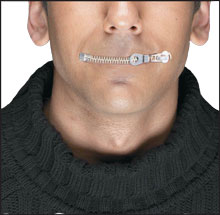 The effort to overturn the Don’t Ask-Don’t Tell policy governing gays serving in the military needs more than just the support of the 120 members of the House of Representatives who have signed on to the bill to replace it with a non-discrimination law. While Maine representatives Tom Allen and Mike Michaud, both Democrats, are on board, the bill’s opponents are focusing their energies on getting moderate senators, like Maine Republicans Susan Collins and Olympia Snowe, on board, despite signs from their camps suggesting either malaise or ignorance on the issue.
The effort to overturn the Don’t Ask-Don’t Tell policy governing gays serving in the military needs more than just the support of the 120 members of the House of Representatives who have signed on to the bill to replace it with a non-discrimination law. While Maine representatives Tom Allen and Mike Michaud, both Democrats, are on board, the bill’s opponents are focusing their energies on getting moderate senators, like Maine Republicans Susan Collins and Olympia Snowe, on board, despite signs from their camps suggesting either malaise or ignorance on the issue.
Allen was among the first to sign on, telling the Phoenix he believes DADT is both “blatantly discriminatory”and “undermines our military readiness.” Michaud echoes Allen, saying “anyone who wants to serve this country should be able to serve”and what DADT boils down to is “just a waste of money.”
But with efforts shifting to the upper house of Congress, this month Collins, a member of the Senate Armed Services Committee, participated in a teleconference with Maine activists — the result was a decided mixed bag.
Steven Scharf, a member of Maine’s Log Cabin Republicans (a group of gay Republicans), says the meeting with Collins and anecdotal conversations with Snowe yielded surprising, if not troubling responses: he says neither knew of a problem with DADT, both saying staff members haven’t imparted constituent concern on the issue.
“After introducing ourselves [to Collins] and talking about some issues, we said we wanted her to be the lead Republican sponsor in the Senate, and that perked her up. She was really taken aback, asking ‘haven’t you found anyone else?’ We said, ‘No, that’s why we’re asking you,’” says Scharf of the meeting with Collins earlier this month.
“She countered by saying that she didn’t see any groundswell for changing the law, but that she will look into the issue and see what the groundswell might be” said Scharf adding that, although hope is not lost, some involved in the conference felt it might be wise to begin to look for other possible lead sponsors.
Scharf got a similar response from a personal meeting he recently had with Snowe. Again, the senator imparted that she didn’t realize that anyone was displeased with the law.
Despite a number of requests, Collins’s office failed to comment on the meeting. Snowe's office didn't return repeated calls seeking comment.
Still, Dixon Osburn, the executive director of Servicemembers Legal Defense Network, a watchdog agency assisting those affected by the law, is optimistic. “I think the citizens of Maine have a huge role to play here in educating their senators that they need to end discrimination, that discrimination hurts, it hurts our ability to defend ourselves. They need to ask their senators to get on board,” he says. “We certainly have every hope that both Snowe and Collins will eventually come on board ... when that moment will be is anyone’s guess right now.”
Signing up
What they seem to be missing is a two-fold problem: DADT hurts gay servicemembers (and those who would sign up if not for the law) as well as the military itself.
When Eric Gundberg, now a 32-year-old Portland business owner, was growing up in rural Unity, Maine, his life seemed geared toward divine service. He was a straight-A student and a cerebral loner who lived by the good book: the son of fundamental Christians, Gundberg went to church at least three times a week and, to this day, claims to be able to recite more of the Bible than anyone else he knows.
One day, having graduated from high school, traveled to Europe and around the US but not yet set up to go to college, Gundberg drove past a Waterville recruiting office and, by his account, said “what the hell.”
Enlisting in 1992 at age 19, Gundberg’s service began at almost exactly the same time Don’t Ask-Don’t Tell was taking effect in the armed forces. He was never subjected to the exacting witch hunts that preceded the law, but no matter: his desire was to stay not only closeted, but off the market for years to come.
“All I really wanted to do was prove to myself that gay men can do this. I wasn’t out at all, I didn’t even lose my virginity until I was 23,” Gundberg recalls, noting that, even though anti-gay jokes were rife in the barracks, no one ever suspected the physically slight Mainer was anything less than a bona fide fly boy. “It never came up. I wasn’t teased more than anyone else; I was always very good at keeping my sexual orientation hidden.”
After studying at the vaunted Defense Language Institute in Monterey, California, where high scores on his aptitude test led to an education in the Korean language (one of the most difficult), Gundberg began to travel the world, all the while remaining closeted.